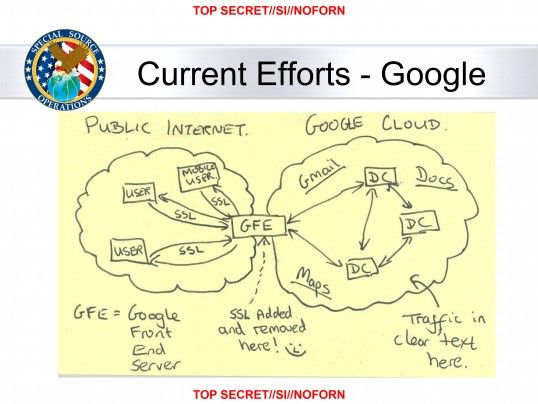“Yes, I believe it is in the nation’s best interest to put all the phone records into a lockbox that we could search.”
–Keith B. Alexander, September 2013
The New York Times has revealed new details about how the National Security Agency is spying on targets ranging from the United Nations to foreign governments to global text messages. We are joined by New York Times reporter Scott Shane, who reports that the NSA has emerged “as an electronic omnivore of staggering capabilities, eavesdropping and hacking its way around the world to strip governments and other targets of their secrets, all the while enforcing the utmost secrecy about its own operations.” The Times article reveals how the NSA intercepted the talking points of U.N. Secretary-General Ban Ki-moon ahead of a meeting with President Obama in April and mounted a major eavesdropping effort focused on the United Nations Climate Change Conference in Bali in 2007. The Times also reveals the existence of an NSA database called Dishfire that “stores years of text messages from around the world, just in case.” Another NSA program called Tracfin “accumulates gigabytes of credit card purchases.”
Transcript can be read here
As U.S. Weighs Spying Changes, Officials Say Data Sweeps Must Continue
by David E. Sanger, The New York Times
The Obama administration has told allies and lawmakers it is considering reining in a variety of National Security Agency practices overseas, including holding White House reviews of the world leaders the agency is monitoring, forging a new accord with Germany for a closer intelligence relationship and minimizing collection on some foreigners.
But for now, President Obama and his top advisers have concluded that there is no workable alternative to the bulk collection of huge quantities of “metadata,” including records of all telephone calls made inside the United States.
Instead, the administration has hinted it may hold that information for only three years instead of five while it seeks new technologies that would permit it to search the records of telephone and Internet companies, rather than collect the data in bulk in government computers. Gen. Keith B. Alexander, the director of the N.S.A., has told industry officials that developing the new technology would take at least three years.
NSA official cites ‘stop and frisk’ in effort to explain searches of phone records
by Ali Watkins, McClatchy Washington Bureau
The general counsel of the National Security Agency on Monday compared the agency’s telephone metadata collection program to the highly controversial “stop-and-frisk” practice used by law enforcement officers, saying the agency uses that same standard to choose which phone numbers to query in its database.
“It’s effectively the same standard as stop-and-frisk,” Rajesh De said in an attempt to explain the evidentiary use of “reasonable and articulable suspicion” to identify which phone numbers to target from the agency’s huge database of stored cellphone records.
De made the comment during a rare hearing of an obscure government body, the Privacy and Civil Liberties Oversight Board, which Congress created in 2004 to oversee the government’s expanded intelligence collection operations but which until Monday had never held a substantive hearing. [..]
The comparison was the latest in questionable analogies that intelligence officials have used in an effort to explain the agency’s metadata collection programs since former defense contractor Edward Snowden revealed their existence in June.
Intelligence officials, for example, have said repeatedly that the collection of hundreds of millions of phone records allows them to build a haystack in which to find a needle, apparently missing the irony that “finding a needle in a haystack” is an expression meant to convey that a task is all but impossible.
NSA’s Path to Totalitarianism
by Norman Pollack, Counterpunch
The New York Times, a recipient, along with the Guardian, of Snowden’s disclosures about the illegal activities of Obama and USG, is breaking out, as now, of its reticence about the nation’s profound disregard of constitutional principles AND its related policies of global hegemony at all costs-here Scott Shane’s lengthy article (3 Nov.), “No Morsel Too Miniscule for All-Consuming N.S.A.” NSA to all intents and purposes appears as a “rogue” organization, extremism in the putative service of liberty, except that the designation is a way of distracting attention, and removing accountability, from its authorization and mission at the highest levels-call it, licensed roguery, official (with Obama’s eyes supposedly averted). Or better, call it, stripped of all cosmetics, the unerring mark of a Police State, itself become identical with Fortress America, the National-Security State.
Eavesdropping on foreign leaders speaks to an arrogance of power, in which the US claims for itself every right, unilaterally, to script both sides of the foreign dialogue as well as micromanage to its own advantage the rhythm and content of global events, from regional trade partnerships to the use of military force in shoring up alliance systems against a host of enemies, some terrorist groups to be sure, but, using that as pretext, mounting counterrevolution globally against alternative modes, notably, socialist, of modernization: autonomous national and/or radical aspirations seeking distance from US market penetration, the tarnished necklace of its worldwide military bases and CIA stations, and not least, the ideological saturation (assisted by IMF and World Bank applications of pressure) of market fundamentalism, the property right, unrestricted capital flows, and the honor of serving American industry with the lowest possible labor costs, as meanwhile we see the financialization of capitalism here and the gutting of the manufacturing base.
Eavesdropping, of course, is the polite term for control freak, which translates, in the realm of power politics, into societal desperation to employ any and all means for staying on top, cyber-strategies of disruption as well as information-gathering, campaigns of disinformation, CIA-JSOC paramilitary programs of regime change, and, upping the ante, as here, learning every move in advance of foreign leaders, the better-take no chances, take no prisoners-to orchestrate world politics in our favor.



Recent Comments